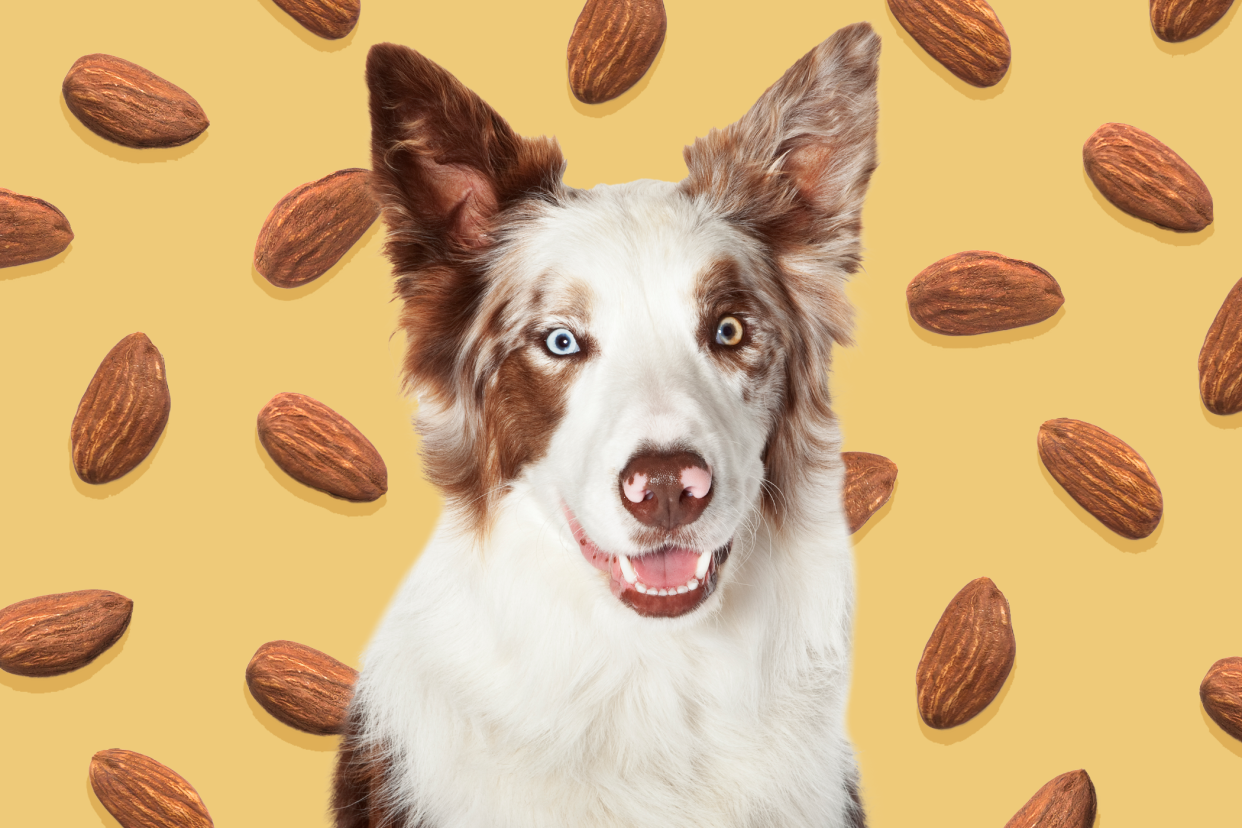Can Dogs Eat Almonds? Nope, Keep This Human Snack Away From Them

Cashews: Eugene03 / Anthony Lee / Getty
TABLE OF CONTENTS
On This Page
Can Dogs Have Almonds?
Why Are Almonds Bad For Dogs?
What To Do if Your Dog Eats Almonds
Can Dogs Eat Almond Butter?
It's no secret dogs love to eat—including when their favorite human is reaching for the snack mix. But can dogs eat almonds?
While a couple almonds are generally not a cause to panic, you should avoid giving them to your dog. The nuts' size and other ingredients pose dangers to your dog's digestive system, so you'll want to stick with canine-safe snacks.
Here's the lowdown on dogs and almonds, including information on almond milk and almond butter.
Can Dogs Have Almonds?
Nope. Dogs can get away with eating a couple almonds, but you should still keep the nuts away from your dog. The almonds in your house are likely sweet almonds, which, while not toxic, can be harmful if your dog eats more than one or two.
"Almonds are actually not toxic to dogs, at least the common 'sweet' almonds," says Nikki Graham, DVM from Nottingham Animal Hospital in Hamilton, N.J. "But bitter almonds are toxic to pets and contain cyanide."
However, bitter almonds are not commonly sold in the United States and, if they are, they're usually clearly marked as such on the package.
RELATED: Can Dogs Eat Nuts? Here's What Vets RecommendCan Dogs Eat Nuts? Here's What Vets Recommend
Why Are Almonds Bad For Dogs?
If your dog eats more than a couple of almonds, they can experience gastrointestinal upset and vomiting or even an intestinal blockage, Graham says. However, the almond itself isn't the only thing that can pose a problem.
Choking Hazard
Almonds are small nuts, and dogs don't typically chew their food the same way humans do, so it's possible dogs, especially small ones, can choke on an almond, Graham says.
Heavy Salt Content
Many almonds are flavored with spices and salt (or even chocolate) that can be harmful to your dog. Salt, probably the most common seasoning on packaged almonds, can lead to water retention or even salt toxicity if consumed in a large quantity.
Long-Term Dangers
According to Graham, the high fat content in almonds can cause or worsen pancreatitis. Additionally, dogs eating too many almonds can result in them refusing to eat the rest of their usual meal. That can throw off the balance of your dog's diet, leading to weight gain and overall worse health.
What To Do if Your Dog Eats Almonds
We've established that almonds aren't safe for dogs, so here's what to do if your dog accidentally eats some.
If your dog has eaten just a few unflavored almonds, especially if they're a larger dog, you shouldn't panic. Graham says to keep a careful eye on your dog for signs of choking, gagging, or vomiting just in case, and to call your veterinarian if these occur.
However, Graham says if your dog has gotten into a whole bag of almonds, or if the almonds are covered in spices or chocolate, you need help. That means call your vet, take your dog to a local emergency veterinary hospital, or call a pet poison control hotline like the ASPCA Animal Poison Control Center at (888) 426-4435.
It's better to be safe than sorry, and seeking immediate care can greatly improve your dog's chances of recovery.
RELATED: Can Dogs Eat Pistachios?
Can Dogs Eat Almond Butter?
Dogs shouldn't eat almond butter—or almond milk for that matter—for one of the same reasons they shouldn't eat almonds: Almond butter and almond milk are both high in fat, which can cause or worsen pancreatitis.
Additionally, Graham says, almond butter and milk can contain additives that can be dangerous for dogs. One of the more common harmful additives to look out for is xylitol, which acts as a sweetener and is highly toxic to dogs.
If your dog does eat something with xylitol in it, Graham says to take them to an emergency veterinarian immediately to prevent hypoglycemia and liver failure.

